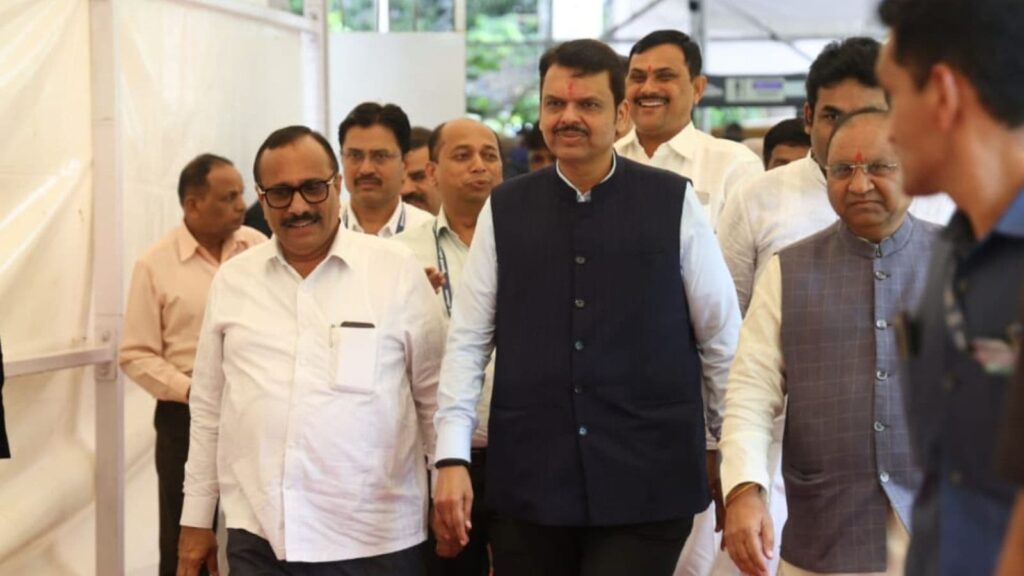The stringent Maharashtra Special Public Security Bill, which seeks “to provide for effective prevention of certain unlawful activities of Left Wing Extremist organizations or similar organizations and for matters connected therewith or incidental thereto”, was passed by the state Assembly Thursday via a voice vote amid Opposition concern over the definition and interpretation of some of the terms and clauses in the Bill.
Chief Minister Devendra Fadnavis, who tabled the Bill in the House and assured members that the Bill would not be misused against political protesters and activists, said Maoists had lost ground in the state and were “trying to brainwash the youth of urban areas and make them stand up against the democratic system”. He warned of the rise of “urban Maoism” and said the Bill would “control them”.
The Bill, which provides for punishment ranging from two to seven years in prison, defines ‘unlawful activity’ as “any action taken by an individual or organization whether by committing an act or by words either spoken or written or by sign or by visible representation or otherwise, (i) which constitute a danger or menace to public order, peace and tranquility; or (ii) which interferes or tends to interfere with maintenance of public order; or (iii) which interferes or tends to interfere with the administration of law or its established institutions and personnel” – the Bill defines four other actions that constitute ‘unlawful activity’.
Maharashtra becomes the fifth state to pass such a Bill. It will now be tabled in the upper house for further deliberations.
Vinod Nikole, the lone CPI (M) MLA in the Assembly, opposed the Bill. “I am the only MLA from the Left party. Violent action should be curbed. There is MCOCA and UAPA. The CM has ended Naxalism in Gadchiroli, but I am opposing this Bill as it can be misused,” Nikole said.
Several others including NCP SP’s Rohit Pawar, Sena UBT’s Bhaskar Jadhav and Varun Sardesai and Congress’s Vishwajeet Kadam voiced apprehension on some of the clauses of the Bill and what one of them felt was an extensive interpretation of the term ‘Urban Naxal’. They also pointed out that not all suggestions of the joint select committee had been included in the revised Bill.
While Rohit Pawar, Sardesai and Kadam did not directly oppose the Bill, they expressed concern over the definition of some of the terms used in the Bill such as activism, Left wing extremism and unlawful activities.
Pawar and Sardesai said the terms are vague and clearer definitions should have been there in the Bill. “Not all suggestions have been included,”Jadhav said. Congress MLA Nana Patole said, “Despite 12,000 suggestions and objections, only three have been accepted.”
Rohit Pawar raised apprehension on the misuse of these “vague” terms. “There is no clear definition of what is Left wing extremist ideology? There are doubts in the minds of the people. What is the need for a new law when there are existing laws? The definitions are vague and opaque,” he said.
Addressing Opposition concerns, Fadnavis said the Bill was not aimed at Left parties or those critical of the government.
“Some members have expressed apprehensions, but this Act is not against any Left wing political party. This is against those organisations which are inciting people to overthrow the Indian Constitution. This is for the internal security of the country. It is not against Left wing parties like CPI or CPI (M). We, in fact, respect them even though we have different ideologies. It is against those organisations whose motive is to demolish the established institutions of our country. They will face action,” he said.
Fadnavis said the CPI (Maoist) was banned in 2009 during the rule of the UPA government, and West Bengal had a Communist party-led government under Buddhadeb Bhattacharjee. There was no question of the Act being against Left wing parties, he said.
Underlining the difference between dissent and extremism, Fadnavis said every citizen has the right to protest, and in case of violence, relevant provisions of the Bharatiya Nyaya Sanhita (BNS) would apply, not the new law.
“This Act is to be invoked only when an organisation’s primary objective is to defy the Constitution or constitutional authorities,” he said.
He said it targets organisations inspired by extreme Left ideologies which, over the years, have aimed to challenge constitutional governance through armed struggle.
“These groups reject democratic institutions and seek to replace them,” he said, citing the ideology of CPI (Maoist).
He said armed Maoist activity had declined significantly in Maharashtra – down from four districts to two talukas – and would be eradicated soon.
Fadnavis, however, warned of the rise of “urban Maoism” where, he said, inactive cadres operate through what seem to pass off as civil organisations, furthering extremist agenda. He cited a 2014 response in Parliament, during the rule of the UPA government, that named several such organisations.
He also said the Centre had urged all states to enact preventive laws on the lines of Telangana and Odisha since UAPA provisions apply only in cases of active terror activity.
“Some of the organisations which are banned in other states where such an Act has been passed have their head offices in our state and they are running their activities. It is like Maharashtra has become a safe haven for these organisations. In the absence of the Act, we were unable to ban these organisations. Hence, this Act is important,” he said.

